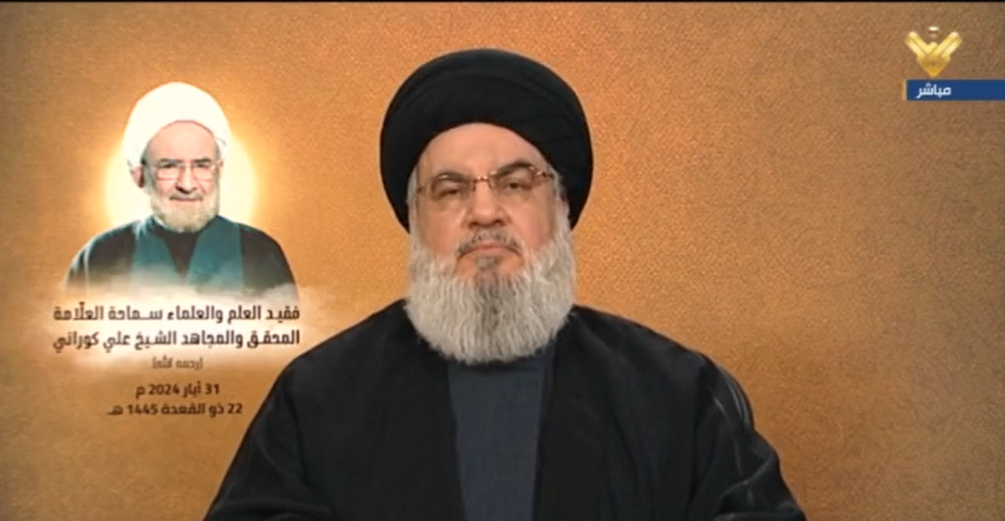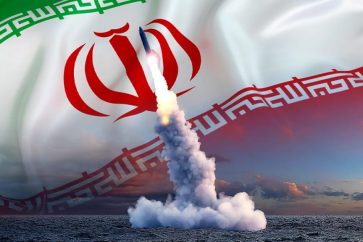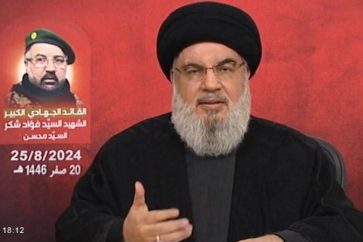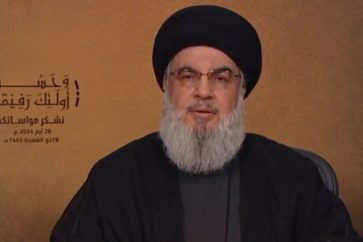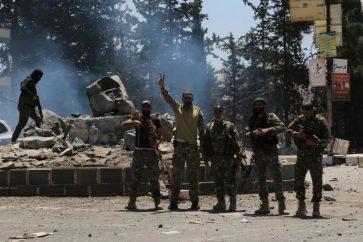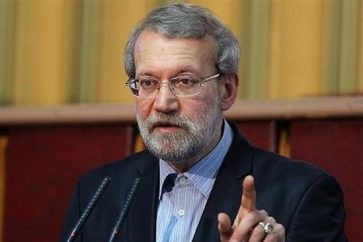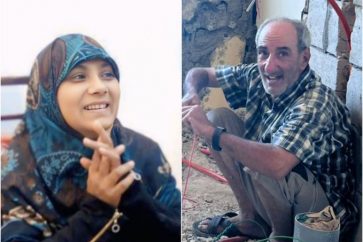Hezbollah Secretary General Sayyed Hassan Nasrallah emphasized the pivotal importance of the ongoing battle in southern Lebanon, stating that it symbolizes the future of Lebanon, its wealth, and sovereignty.
During a televised speech commemorating the late scholar Sheikh Ali Kourani at the Al-Mujtaba Complex in the southern suburb of Beirut on Friday, Sayyed Nasrallah addressed the occasion, discussed the situation in Palestine and the Al-Aqsa flood, and concluded with remarks on the current situation in Lebanon.
On Sheikh Kourani’s Legacy
Sayyed Nasrallah began his speech by highlighting Sheikh Kourani’s extensive efforts in religious preaching across Iraq, Kuwait, Lebanon, Iran, and various African and Arab countries, where he authored over sixty books on biography, beliefs, and other subjects.
His eminence praised Sheikh Kourani’s contributions, particularly his pioneering introduction of modern technologies into seminaries and scientific research. He highlighted the “Ahl al-Bayt Library Program,” a computer program completed by Sheikh Kourani, which allows researchers to access materials, describing it as an ongoing charitable contribution.

Sayyed Nasrallah also noted that these achievements were made possible under the auspices of the authority of Sayyid Ali al-Sistani.
He also highlighted that Sheikh Ali Kourani was profoundly influenced by his teacher, Mr. Abdul Hussein Sharaf al-Din, as well as by previous scholars. “His unwavering commitment to Palestine extended from the sea to the river, firmly believing in the victory of the resistance and the eventual demise of the entity,” the S.G. said, emphasizing that Sheikh Kourani was eager to witness this outcome, “and the series of victories reinforced his belief that they were closer than ever to achieving it, based on divine promise.”
“Sheikh Kourani firmly believed that the demise of ‘Israel’ was inevitable and a matter of time, not contingent upon the appearance of the Imam. He believed it would occur before his appearance,” Sayyed Nasrallah further stated, stressing the importance of continuous effort, day and night, to eliminate this “cancerous entity” from the region.
“We firmly believe that this entity has no future in our region,” he said. Sayyed Nasrallah also noted that Sheikh Kourani closely followed the resistance movements and the events surrounding the Al-Aqsa flood with great interest.
On Yemen
The recent American-British aggression against Yemen prompted Sayyed Nasrallah to extend his condolences and blessings to the Yemeni martyrs.
“We stand in solidarity with the Yemeni people and army in the face of the American-British aggression they have been subjected to, and we ask Allah to accept the martyrs in heaven,” He pointed out.
He emphasized that Yemen’s stance has always been clear: any American aggression will not diminish Yemeni support for Palestine and Gaza. “I praise Sayyed Houthi’s announcement that “regardless of the aggression, Yemeni support for Palestine and Gaza will not be affected.”
On Gaza Front
Moving on to the ongoing battle in Gaza, Sayyed Nasrallah highlighted the world’s helplessness due to American protection. Despite this, some still rely on the international community for deterrence and protection.
His eminence criticized Israeli Prime Minister Benjamin Netanyahu and his allies for continuing a war of extermination, expressing gratitude that these crimes are awakening the world, and noting the global condemnation of aggression and massacres, as well as the increasing recognition of the State of Palestine, all of which are considered blessings stemming from the Operation Al-Aqsa flood.
“Netanyahu and his lunatics continue their war of extermination, met with the silence of nations and rulers. However, these crimes are awakening the world,” he said.
Sayyed Nasrallah also criticized Netanyahu for exacerbating the situation for the entity, citing statements from the head of the Zionist Central Bank and military officials about crises and disasters.
“Netanyahu’s stubbornness in continuing his war is evidently exacerbating the situation for the entity. The head of the Zionist Central Bank addressed a looming disaster, while army commanders and senior military officials in the entity highlighted the crises and disasters unfolding,” Hezbollah’s leader pointed out.
He highlighted a statement by a member of the Zionist War Council, Gadi Eisenkot, regarding the difficulty of fighting against a disbanded battalion in Jabalia, noting the necessity of entering Jabalia with a full division of the Israeli army.
Sayyed Nasrallah emphasized the importance of viewing this battle not just as one of existence, as Netanyahu and extremists in the entity see it, but also as a battle of destiny. “While Netanyahu and the extremists in the entity perceive this battle as one of existence, we must also see it as a battle of existence and destiny.” He stressed that unlike in other regions where financial and humanitarian support might suffice, in this case, moral and human solidarity is not enough.
“If we were in America, distant Asia, or other regions, financial and humanitarian support might suffice; however, here the situation is different, and moral and humanitarian solidarity alone is insufficient,” he stressed.

Lebanon’s Front vs. Internal Issues?
Turning to Lebanon, Sayyed Nasrallah emphasized that this battle signifies the future of Lebanon, its wealth, and sovereignty.
“The electricity crisis in Lebanon is partly due to American involvement and obstruction in the issue of oil fields in Lebanese waters,” Sayyed Nasrallah pointed, stressing, “This is a battle of destiny for all of us, and we must all be fully committed to it, especially in southern Lebanon.”
This front, he said, “is a pillar of support and a crucial part of the battle that shapes the fate of Palestine, Lebanon, and the region, far from the narrow calculations of some Lebanese.”
“The South Lebanon Front is a pressing, strong, and influential front against the Zionist enemy. The leaders of the entity came to the north to boast about pushing the resistance kilometers away, but the response came swiftly with an operation just a few meters from their location. If they had intended to enter the site, they would have done so,” Sayyed Nasrallah stressed.
“Since 1948, there has been a tolerance for the burdens and aggression of this entity, and the environment is still supportive, loyal, and steadfast. With the blessing of its steadfastness, victories were achieved in May 2000 and July 2006,” he added.
“We believe that we constitute the largest popular base and political party in Lebanon, yet we have not approached the issue with such a mindset. Conversely, there are those who claim that the majority of the Lebanese people are against providing support and assistance to Gaza! It is not true that the rejection by some represents the position of the majority of the Lebanese people,” Sayyed Nasrallah stressed.

Regarding the issue of the presidential elections in Lebanon, Sayyed Nasrallah clarified that attributing the obstruction of presidential elections to the Gaza Support Front is inaccurate. He emphasized that internal disputes and external interference, disguised as assistance, were the actual causes of the election delays prior to the Al-Aqsa flood.
His eminence dismissed the notion that Hezbollah is complicating matters, describing the proposed steps for the presidential dialogue as normal. He referred to Speaker Nabih Berri’s proposed dialogue, which is facing opposition from the Lebanese Forces-led opposition.
Sayyed Nasrallah emphasized that the battle in the south and Gaza is unrelated to the presidential elections in Lebanon, and there is no correlation between the two. He stressed that the outcomes of the southern battle hold greater significance than mere internal and political gains, akin to the liberation in 2000 and the victory in 2006.
Addressing spreading rumors, Sayyed Nasrallah said: “For weeks, we have heard claims that all Lebanese people oppose this battle, but this is false. Are not all the martyrs who have fallen Lebanese? Are not the thousands of fighters on the front Lebanese?”
“Opposing matters that are fundamentally beneficial, under the guise of formal opposition, is what obstructs progress towards the presidential elections.” Sayyed Nasrallah highlighted, “We belong to the resistance front, which has now expanded to its widest breadth ever, with a promising future ahead.”
Sayyed Nasrallah also asserted that “the resistance front today is broader, more comprehensive, and larger than ever before, while the enemy front, as admitted by Zionist officials, is in a dire situation unseen in the past 79 years.”
Source: Al-Manar English Website

